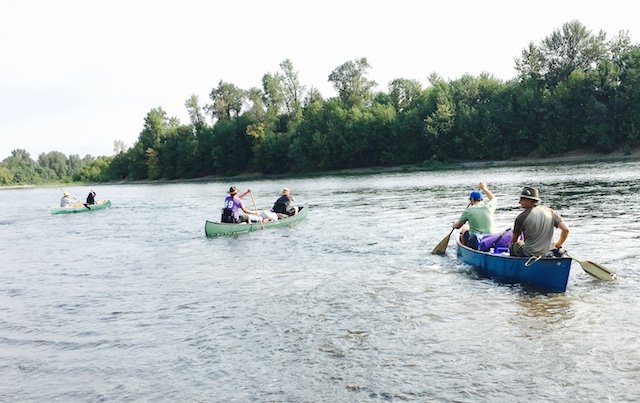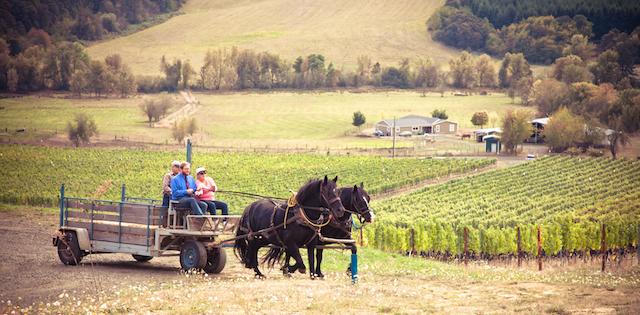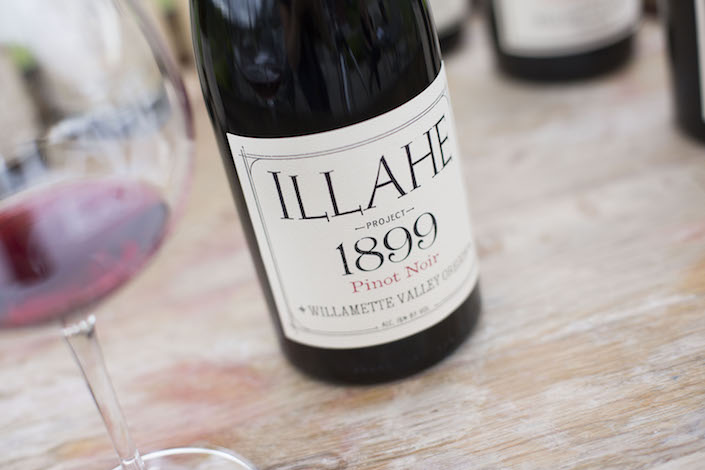
DALLAS, Ore. — Brad Ford and his team at Illahe Vineyards – which includes a pair of draft horses – take the “old school” approach to winegrowing, but for the next three days they next will rely on mules, canoes and manpower rather than horsepower to make a delivery of Pinot Noir to Portland.
It’s the fourth annual 96-mile trip for the Illahe Vineyards Project 1899 Pinot Noir, the 2016 vintage of Ford’s project created without the use of modern equipment, fossil fuel or electricity at his family’s estate and winery in Dallas, Ore.
“The idea to deliver our wine to Portland by canoe came to me while I was standing outside of our distributor’s warehouse on the east side of the Burnside Bridge,” Ford wrote via email to Great Northwest Wine. “We had a wine up the river that had been made completely by hand and horse power, and it seemed natural that we should try to get it to market the same way.
“Now we use a mule-powered stagecoach and five canoes to make the three-day trip,” Ford added. “The wine is delicious, and the trip is a journey to honor true wine and a time when hard work, careful crafting, and simple pleasures were the only options.”
The Lewis and Clarkesque voyage began with a six-mile portage to the Willamette River via mule-drawn stagecoach. At the town of Independence, the canoes divided up a sizeable portion of the 150-case production. If all goes according to plan, the party will spend Sunday night on Grand Island after negotiating 26 miles of the river.
Illahe Vineyards roots stretch back to 1983

Ford’s delicious array of estate wines and fascinating story prompted Wine Press Northwest magazine to select Illahe Vineyards as its 2011 Oregon Winery to Watch. Ford’s father, Lowell, established in 1983 their first vineyard in West Salem, growing Pinot Gris and a bit of the Austrian white Grüner Veltliner.
In 2000, Lowell purchased the 80-acre parcel in Dallas near Freedom Hill, where the family planted Pinot Noir, Riesling, Viognier, Tempranillo, Lagrein and Teroldego, along with more Pinot Gris and Grüner. Their first clients included Bethel Heights, Cristom and Evesham Wood until launching the winery with the 2006 vintage.
Their vineyards are certified LIVE and Salmon-Safe, and Illahe is a member of the Deep Roots Coalition. It all fits, even the name, which is a Chinook tribal word for “earth” or “place” or “soil” — which the French and the rest of the wine world would refer to as terroir. Instead, the Fords just say “ill-uh-HEE.”
13-mile bike ride caps delivery trip

However, their vineyard, their hand-harvesting and winemaking techniques go beyond that. They hitch up draft horse Doc and Bea for a more carbon-neutral approach. They harness solar power and collect rainwater from their roof for winery cleaning. A cave in the hillside is used to age the wine.
Still, there is technical precision to the wines. Brad, 47, a grant writer in his previous life, studied chemistry at Portland State University and winemaking at Chemekta Community College. His work references include Joe Dobbes and Domaine Serene.
The 1899 project includes de-stemming by hand and the Fords’ use of bicycle-powered pump to move the wine from fermenters to barrels. After 22 months in barrel, the Pinot Noir is hand-bottled and labeled by hand.
On Monday, Team Illahe travels 27 miles down the Willamette to Champoeg State Park. Delivery day is Tuesday, when the fleet cruises 24 miles in the canoes to Oregon City. Rather than face Willamette Falls, they will ride cargo bikes for the final 13 miles into Portland.
Until then, the 2015 vintage of the 1899 is available ($68) for online purchase.

Leave a Reply